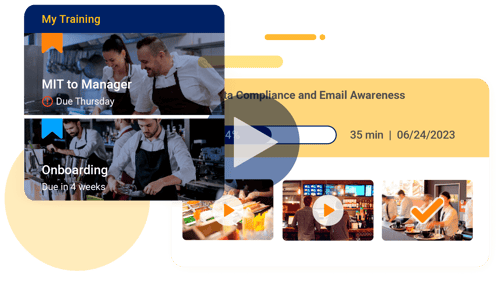In the fast-paced and dynamic world of the restaurant industry, staying ahead of the curve requires a commitment to continuous learning and development.
In the 2023 Restaurant Operations Report, operators ranked training and development as the top priority for driving success in other parts of the business; the top three strategies for reducing labor costs were training, incentives, and retention.
While many brands are adopting an LMS (Learning Management System) to support this ongoing training, not every LMS is well-suited to support multi-unit restaurants. To help you make an informed decision, we've outlined three crucial features to look for when selecting an LMS that will meet the unique needs of the restaurant business.
1. Expansive Mobile App Capabilities
Unlike in a corporate setting, where employees may often be sitting at a desktop computer, restaurant employees work in a bustling environment where everyone is constantly on the move. For this reason, it's typically more common to see phones or tablets as the device of choice in restaurants.
When shopping for an LMS for your restaurant operation, you want to look for a platform that goes beyond mere mobile responsiveness. The LMS you choose should provide a robust mobile app and mobile-first design of its end-user features to ensure a seamless and user-friendly learning experience on smaller screens.
Be on the lookout for these qualities to ensure that your restaurant’s LMS has the mobile app qualities you need:
- Intuitive Interface: The mobile app should have an easy-to-navigate interface, allowing users to access content effortlessly.
- Offline Access: A robust mobile app should allow employees to download training materials for offline access. This will enable learning even in areas with poor connectivity and prevent training interruptions like loss of progress.
- Micro-Learning: The LMS mobile app you use should include an easily discoverable home for modular resources. For example, a recipe or a machine troubleshooting guide that an employee may need a refresher on.

2. Talent Development Functionality
The restaurant industry experiences employee churn at a much higher rate than other industries, with QSR restaurants reporting a staggering 150% annual turnover rate. What’s more, the average cost of one churned restaurant employee is $5,864. In order to build bench strength and retain employees longer, restaurants should choose an LMS with talent development functionality.
Talent development within an LMS focuses on nurturing and developing the skills of your most capable restaurant staff. Restaurants that invest in the continuous growth of their employees not only improve overall service quality, but also create a positive and motivating work environment where team members believe they can have a bright future at your brand.
Here are some features that indicate adequate talent development capabilities in a restaurant LMS:
- Performance Analytics: A restaurant LMS should have features that identify high-performing team members to help leaders identify who should be given the additional development they need for a promotion.
- Personalized Learning Paths: Your LMS should enable you to create and assign specialized learning paths for different roles within the restaurant, ensuring that each employee receives targeted training.
- Skill Assessments: Robust knowledge validation on assessments will help track the progress of each employee's skill development and ensure their expertise before you give them more responsibility.

3. Restaurant-Specific Content
Generic training content likely will not address the specific challenges and nuances of your restaurant business. Having industry-specific content featuring real restaurant situations ensures that your employees are not only more engaged, but are equipped with the knowledge and skills needed to excel in their roles. This can include content that meets compliance requirements, but could also be training on topics like optimizing the flow of serving each table in your section, or de-escalating a guest that is dissatisfied with their food.
Here’s what to look for when searching for an LMS to make your training content more restaurant-specific:
- Out-of-the-Box Restaurant Courses: An LMS provider that has pre-built courses available for download or purchase that cover essential restaurant topics will save time and resources, accelerating the launch of your training program.
- Enables Legal Compliance: Your LMS provider should support necessary compliance training, and in some cases, provide the course content needed to ensure that your brand meets legal compliance requirements for each state you operate in. This includes regulations related to food safety, employee rights, and health codes.
- Custom Content Upload and Personalized Learning Paths: You know your restaurant best, so it’s critical that you be able to communicate your brand standards in custom training with a variety of content types and set up the learning paths that work best for each role in your restaurant.
By considering these key features, restaurants can enable easy continuous learning, reduce turnover, and feel confident that the LMS they’ve chosen will enhance their overall operational success. To learn more about learning and development, visit crunchtime.com/learning-and-development.